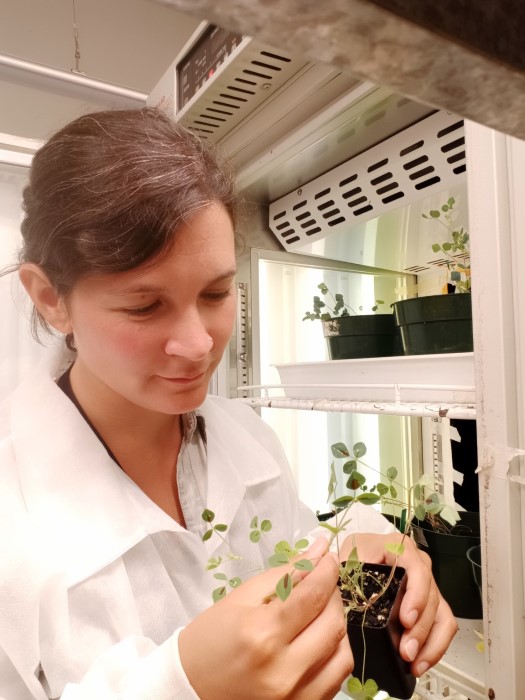Research
Published 21 March 2023Tick Tock! Circadian clocks and climate-resilient crops

In this Marsden Fund Fast-Start project, Dr Soledad Perez-Santangelo from the University of Otago Te Whare Wānanga o Ōtākou is investigating a key mechanism for how plants may adapt to a changing climate.
Climate change is causing increasing temperature fluctuations, droughts, and floods across the planet. These changes affect agricultural land, putting pressure on crop yields and global food production.
Most organisms, including plants, have an internal timing device known as the circadian clock, which senses daily environmental changes and modifies physiology accordingly. The clock helps plants thrive by anticipating environmental changes and controlling biological processes such as water use, carbon use, flowering time, and stress responses. The processes are primed so that they occur at the best moment of the day or season. Plants that have an internal clock that is in sync with their local environment will improve their growth and survival. By studying the natural variation that exists in circadian clock function in plants worldwide, scientists can develop crops better suited to growing in the new environmental conditions which result from climate change.
Dr Perez-Santangelo is studying the natural variation of clock function present in the legume plant family. Legume crops like beans, lentils, and peas are an incredible source of plant-based protein, vital for increasing soil nitrogen through crop cycling. Dr Perez-Santangelo’s laboratory works on a legume species known as barrel-clover. This species has the great advantage of having a collection of more than 200 genetically sequenced plant specimens from its native Mediterranean origin, so she and her team have information on the exact geographic location of each specimen and its genetic sequences.
Dr Perez-Santangelo has established an automated method to measure leaf movement – a key process controlled by the clock. Many plants open their leaves just before sunrise to capture the most sunlight for photosynthesis and close them or 'sleep' at sunset for protection. Dr Perez-Santangelo measured leaf movements for a selection of barrel-clover plants from across their natural geographic range, discovering that plants from different regions had different leaf movement timings. She then compared these timings with their genetic sequences and found out which genes are behind the natural variation of the circadian clock. She now has a list of genes that can be targeted to develop legume plants that thrive under a specific range of environmental conditions.
The circadian clock also helps plants cope with daily temperature changes, through a phenomenon known as temperature compensation. The clock can maintain its specific internal timing throughout a range of temperatures without being altered. Interestingly, Dr Perez-Santangelo found a group of plants from her collection that were not able to temperature compensate as expected. These plants changed their internal timing of leaf movement depending on the temperature they were in. This finding has important implications for our increasingly warming world, where plants that are out of sync with the changing environment will be unable to thrive or even survive. Changes were found in candidate clock genes that could be responsible for this behaviour and are currently being investigated.
Based on these findings, Dr Perez-Santangelo will next investigate which genes are involved in perceiving temperature in legumes, and how this information is passed to the circadian clock to coordinate plant developmental responses. By discovering the genes that link temperature sensing and clock function, scientists will be able to apply tools such as genomics-assisted breeding to develop climate-smart crops that are more resilient and can sustainably maintain yield under increasing temperatures.
RESEARCHER
Dr Soledad Perez-Santangelo
ORGANISATION
University of Otago Te Whare Wānanga o Ōtākou
FUNDING SUPPORT
Marsden Fund
CONTRACT OR PROJECT ID
UOO1813 'Adjusting the clock: How naturally occurring variation in circadian clock genes maximises plant growth and fitness in different environments.'
